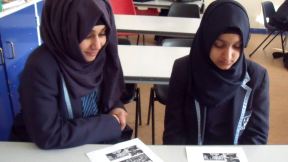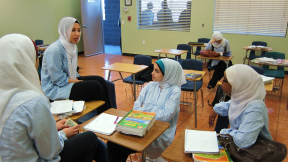
What does it take for parents to get a teen to become a practicing Muslim?
Sound Vision has talked to parents, Imams, activists and Muslims who have grown up in the West to ask what are some practical things parents can do to help Muslim teens maintain their Deen. These are some of their suggestions:
Tip #1: Take parenting more seriously than you would a full-time job
This means both parents must understand their children are a trust from Allah, and He will ask how they were raised. If the children do not grow up practicing Islam because of their parents' negligence, it is not going to be pretty in this life or the next.
Tip #2: Reduce or change work hours and exchange them for time with the family
It is better to have one full-time job, fewer luxuries in the house (i.e. more cars, expensive clothes, a bigger, fancier home) and more time with the family, than many material things and absent parents. This goes for mothers AND fathers. Parents can't instill values in their children if they just aren't there, period. Quit that extra job on the weekends or in the evenings and instead drive the kids to the mosque for Halaqas and activities instead. Or consider switching shifts at work so that you're home when the kids are.
Tip #3: Read the Quran, understanding its meaning, for five minutes every day
Just five minutes. Whether it's in the car during a traffic jam, early morning after Fajr, or right before you go to bed, read the Quran with a translation and/or Tafseer. Then watch the snowball effect. You will, Insha Allah, reconnect with Allah, and in the long run, develop into a role model helping your whole family, not just your teen, reconnect with Him too.
Tip #4: Attend a weekly Halaqa
Trade playing cards or watching television on Sunday afternoons for a Halaqa. If you don't have something already in place during that time slot, help the Imam to set one up. Attend it vigilantly. The added bonus of this is that when children see their parents striving to learn about Islam, they will in many cases be encouraged to do the same.
Tip #5: Respect your teen
Respecting your teen means not treating them like inept babies, but like maturing adults, not talking down to them or humiliating and insulting them. It means involving them in useful activities around the home and seeking their opinions on matters of importance.
Tip #6: Take an interest in what they do
Does Noor play hockey in an all-girls' sports league? Attend Noor's games as regularly as possible. Does Ihsan collect stamps? See if you can find old letters from your parents in Malaysia or Lebanon and pass the stamps on them to her. Does Muhsin love building websites? Visit his site, post a congratulatory e-mail on the message board and offer some suggestions for the site. Give him a book on advanced web design as Eid gift.
Tip #7: Be aware of problems and address them straightforwardly
As you spend more time with your teen, you will be more able to sense if there is something bothering them. Don't brush this feeling under the carpet. Address it straight on. But don't do this in the family meeting or n in front of others. Do it during the next tip.
Tip #8: "Date" your teenager
While dating is commonly associated with boy-girl social meetings, the concept can be extended to any meeting between two people wanting to get to know each other better.
It's especially important to "date" your children on an individual level once they hit their teens because they are no longer just "one of the kids". They are young adults who need attention and guidance on an individual level. You can go out on a "date" when Sumayya graduates from high school (instead of going to the prom), when Ahmed gets his driver's license or if you feel there is something bothering them and you want to address them alone.
Tip #9: Don't just be your teen's parent, be his or her partner
Making them a partner means giving them responsibilities within the family. Get 16 year old Amir, who just got his driver's license, to help his mom with grocery shopping on Saturday's; get 15 year old Jasmine, who loves flowers, to be responsible for the garden and mowing the lawn. This way, teens will feel a part of the family, included and needed.
Tip #10: Build a Masjid in your home
Delegate a room, part of the basement or the living room as the home Masjid. You can do this for less than $25.
Make this Masjid entirely the responsibility of the kids. Get the eldest to be in charge and to delegate responsibilities for younger siblings. Responsibilities include keeping the Masjid clean, waking people up for Fajr, calling the Adhan, etc.
Tip #11: Don't practice "men's Islam"
That means don't exclude wives or daughters from prayers. When the men are praying in Jamaah, make sure the women are either behind them or also praying in congregation. Make sure the Imam recites the prayer loud enough for the women to hear if they are in another part of the house. Also, encourage women to pray in Jamaah if there are no men present.
Tip #12: Establish an Islamic library and choose a librarian
Equip your home with an Islamic library with books, video and audio cassettes about various aspects of Islam, catering to everyone's age and interests. If 13-year-old Bilal likes adventure novels, for example, make sure you have a couple of Islamic adventure books
Get one of your teens to be the librarian. S/he keeps materials organized and in good condition. Any requests for materials to be added to the collection have to go through him or her. Give this librarian a monthly budget for ordering new books, cassettes, etc.
Tip#13: Take them out.....to Islamic activities
Instead of a fancy dinner at a restaurant, save your money to take everyone out to the next Muslim community dinner or activity. Make a special effort to go to events where other Muslim teens will be present and the speaker caters his/her message to this crowd.
It's also important to regularly take Bilal and Humayra to Islamic camps and conferences where they will meet other Muslim kids their age on a larger scale.
Tip #14: Move to a racially and religiously mix neighborhood in your city
If your children can interact with Muslim as well as non-Muslim children on a daily basis, it is going to be healthier for their growth. May be a move closer to a masjid is going to help as well.
Tip #15 : Help teens start their own youth group
After living in a Muslim neighborhood and attending Islamic activities regularly, teens in many cases will develop a friendship with other Muslims their age. Don't let this end here.
Help them establish a youth group, not just to learn about Islam, but to go to the amusement park together, go swimming, etc. Have meetings at members' houses on a weekly or bimonthly basis. Get this group involved in useful work like cleaning up litter around the Masjid or visiting senior citizens' homes.This group must have parental supervision, although teens' decision-making powers should not be interfered with unless really necessary.
Tip #16: Establish a TV-free evening and monitor TV watching in general
Parents' biggest competitor for their children's attention is the T.V. Sound Vision's unTV guide. Monitoring what everyone watches simply means taking care to remind and help everyone avoid shows which depict sex, violence and encourage unIslamic activities. Put up a list of acceptable and unacceptable shows on the wall beside the T.V.
Establishing TV-free evenings means having one evening of the week when no one, adult, teen or child is allowed to watch television. Hopefully, this is a first step towards general TV reduction in the home. This is an ideal time to have the next tip.
Tip #17: Have weekly family meetings
The purpose: to find out what is going on in everyone's lives and to consult the family on important issues. Hanan started attending a Halaqa, Imran just returned from a Muslim youth camp, Bilal aced the last algebra test. The point is not to just give this news in point form. It's to elicit discussion and communication between everyone, and to keep up-to-date about what is going on in everyone's life, which gets harder when kids become teenagers.
This is also the place to consult the family and decide on major issues affecting everyone: a move to another city; a marriage of one of the family members; difficulties with a bully in school, etc.
Please note: Shura in the family does not mean a majority vote determines what to do about a situation. While the parents remain in charge, teens and younger children voice opinions and suggestions parents will consider in making a final decision about a matter.
Tip #18: Have "Halal Fun night" once a month
"Fun is Haram" is a joke sometimes heard amongst Muslim youth, mocking the attitude of some Muslims for whom virtually anything enjoyable is automatically labeled Haram (forbidden).
Islamic entertainment is a much neglected area of Muslim concern. Islamic songs, skits, etc. are a viable tool for the transmission of Islam. Maybe 16-year-old Jameel knows how to play the Duff, while his sister Amira, 14, can write and sing well. Let them present their own Islamic song to the whole family. Or have 12-year-old Ridwan recite some of his best poetry. Make one of the teens in charge of this event. Help them establish a criteria of acceptable and unacceptable Halal entertainment.
Tip #19: Provide the right role models-What would Abu Bakr have done?
Apart from being a role model yourself by trying to practice Islam, make sure you provide teens with reading material about the Prophet Muhammad (peace and blessings be upon him) and his Companions (Sahaba), both the men and the women. Otherwise, the characters on the programs your kids watch on television may become their "Sahabas".
Discuss what a Companion may have done in a situation relevant to teens' lives. What would Abu Bakr Siddiq do if he saw a someone selling answers to the grade 11 math final exam? What would Aisha have done is she was confronted with the opportunity to cheat her parents?
Tip #20: Read books on Positive Parenting
These can be books written by Muslims, but even books by non-Muslims can help. However, just be ready and make sure you are able to identify what is Islamically acceptable versus what is not.
Tip #21: Get them married early
The societies of the West are permeated by sex: on TV, billboards, on the streets, buses, in movies, etc. A Muslim teenager facing this is in a tough position: succumb to the temptations or try really, really hard not to. Getting them married early (check out some tips for parents) will ease the pressure, and they don't have to stop their studies to do this. Remember, as a parent you will also be partly responsible if your son or daughter wanted to marry, you stopped them and they ended up having sex outside of marriage. You should also remember when undertaking this step not to force your son or daughter to marry someone they do not like.
Tip #22: Last but not least-Make Dua
Make Dua. It is really Allah who guides and misguides, but if you've done your job as a parent, Insha Allah, keeping your teen a practicing Muslim will be easier to do than if you had neglected this duty. As well, make Dua for your teen in front of them. This reminds them how much you love them and your concern for them.










Comments
You are wrong.
It's perfectly normal for a teen to be left alone at home. Also, you cannot control what is in her head.
An intelligent person will learn to lie in order to accomplish their personal goals and discover life on their own terms, free of regressive thoughts and oppression.
The only threat to your daughter's intellectual development is not boys or texting or the internet, it's your entire culture.
Become an actual human being by offering total personal freedom to the ones you say you love.
Location
Same here
I'm in the same situation as you sister please help. My daughter is 15 I feel it is too me from r marriage
Location
Never leave your children
Never leave your children home alone. Once or twice is okay but if it is habitual than it's a problem. Humans are made weak by nature. In this day and age in a society which is a very corrupt it is unacceptable to leave your child alone in any circumstance except emergency situations, I recommend a guardian like a family member or friend which keeps watch over her until your arrival.
You gotta be kidding me!
She's 14! It's perfectly normal to leave a teen home alone.
Yeah, we're kidding you all right.
Yeah, and it's perfectly normal for these 14-year-old teens to lose their virginities, to learn to blow (both sexually and narcotically), and flaunt their newfound sexuality around. The entire point of this article is to prevent these vices from spreading from the Western-atheist family unit to the educated Muslim family unit. Are you sure you didn't simply mistype bruceonpolitics.com in getting here?
Location
thank you
thank you so match for so power full advice me allah bless you
Location
I have problems with my parent
My name is Umar Alli, I am 19yo from nigeria and my parents lack parenting skills..they take islam as a force thing and truth be told I am starting to get tired of being a muslim even their parenting sucks because they take islam as force..I have been with them for 19 years and I am sure they don't know anything about me, well they think they know a lot about me..and I believe part of parenting and islam is knowing what your child like and doesn't like and don't use what he doesn't like to play with him..my parent does that a lot and when I tell them I don't like it they say they are my parent and they can do anything they want to me and he keeps quoting the quran buh the truth is islam doesn't want us to inconvinient anybody even your enemy... Please I need somebody to talk to and gimme advice about it.. My whatsapp is +2348072867618.. My facebook is faruq alli balogun (gfx guy)
Location
Parenting force
I am 12 years old i lived a very simple easy normal life until my dad was murdured in 2016. And know i am forced to wear Hijjab and i am not comfortable with all the forcement like don't make boys friends but duh my mom says making friends is not a bad thing she says you can make boys or girls friends and both are bros and sis's but on the other hand my guardian which is my grandfather does not want me to make any friends boys or girls but i ask my self that why did her daughter still not wear hijjab and she makes boy and girls friends too. It is just that being a muslim is very hard i don't even like the feel of being forced i liked wearing hijjab at first but when the forcements come then don't like it anymore and not just this their are more things i have gone through its a hard life for me and i hate my life
Location
The solution
Vindicate your father. Take revenge for his murder, and you will come to love life.
Location
Sons father is not a muslim
Assalamu alaikum everyone.
Jazak Allahu khairan for some very useful tips.
I am going through testing times with my 12 year old whom I had before I reverted. Therefore his father is not a muslim and in my opinion influences my son in soo many haram things. It is difficult because I try to always ensure we are surrounded by fellow muslims with boys similar age. But only recently he said he didn't want to be a muslim any more, this really hurt and has left me wondering what I can do to encourage him?
Any advice would be more than welcome
Jazak Allahu khairan
Any advice
Location
Pages
Add new comment